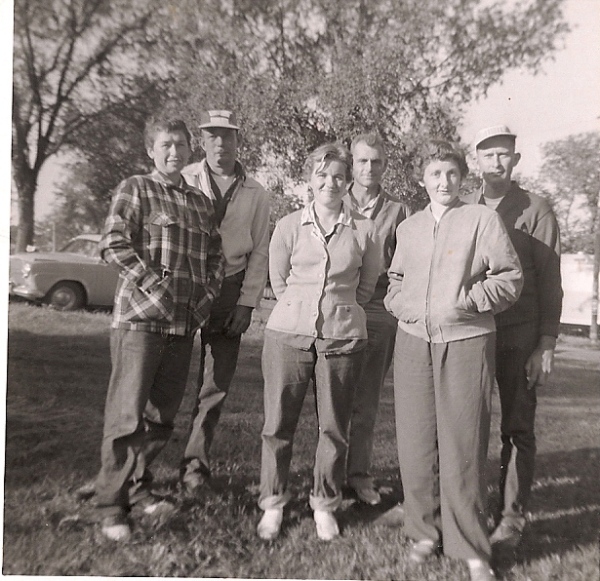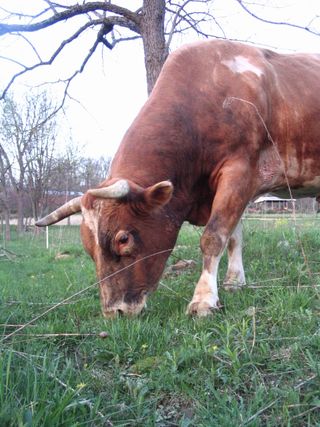The Yarmouth Heist by the Watkins and Willson Gang
Some imbibing farm owner talked often talked too much and revealed information that could be used against them. In this case, the B. H. family lived a quarter of a mile north of the Willson farm. The Watkins and Willson families often got together to play pitch or pinochle. In those days, social life centered around meals, cards, and homemade ice cream. Terry Willson and I became the best of friends, always ready for a minor caper.
Sometimes the discussion around the card table included the difficulties of the sharecropper life. There were months when putting meals on the table would have been impossible without a great deal of ingenuity. Bob Watkins and Grover Willson were two men that were willing to hover near the line of the tolerably illegal to secure what their family needed.
I specifically remember fishing with dynamite or a telephone magneto, two practices considered illegal by the game and fish commission of Iowa. These were “never fail” methods when the hook and bobber attracted no fish. One stick of dynamite thrown into a creek could easily bring a bushel basket of fresh stunned fish rising to top to be collected with fish net on a long pole. The magneto produced an electric shock when two copper wires were attached to the positive and negative poles on the magneto. Then, we just dropped one wire over each side of the boat and an electric charge rushed out in all directions trying to find an object upon which to discharge. This method was rather selective since it sent an electric charge to the bottom dwelling catfish. Regardless, rain or shine the two systems were foolproof and nearly free except for a stick of dynamite that was always laying around in a secured box in our garage to blast an unwanted tree stumps from the ground.
But, in the worst of times, our families were not above stealing from some of our less appreciated neighbors. I think you will certainly agree that some neighbors are far from ideal. Since we always got by with the bare necessities, it was humiliating to drive by neighbors that lived like kings and queens, and gave their workers very little for being pushed so hard every day.
Word had gotten out that the B. H.’s had quite a bit of gold hidden in different parts of their large house. What we didn’t know was where. But, we connived that if we could enter when everyone was soundly sleeping, we could hunt carefully. A problem was how to break in without alarming them. We decided to make a visit to their house during the limited darkness of a full moon. Our fathers would make the exploratory visit. They would wear ski-mask and heavy brown coveralls during the initial quest for the most viable hiding places for the gold.
The neighbors lived very close to a small creek running through their property. Huge oaks and maples dotted the property. Our fathers questioned whether the cache might be hidden in one particular old tree that appeared to be dead, but had slabs of wood, eighteen inches long, nailed into the side of the tree leading up to an abandoned tree house. A few of the steps had long since fallen making the climb to the structure above nearly impossible. They would return we very early in the morning to investigate the tree in early sunlight, hoping the tree would be the home to the gold.
Dad, Grover, Terry, and I would make the heist on a very cold morning three days before Christmas. We hoped the near freezing temperatures would keep the victims sound asleep while we struck. We all carried an ax, a long pry bar, a chain saw, and six five gallon buckets in case there was adequate loot to haul away. A quick look at the tree in the light of the morning revealed that the suspected hiding place was nearly 12 feet up the tree in the first vee where the trunk branched into three huge limbs that were the supports for the tree house. The tree would have to be cut down to reach the loot. We were concerned that such a racket would bring the owners of the gold to protect their loot. We would have to strike quickly and escape into the woods.
When the tree fell, it broke into several large divisions and exposed more gold than we had expected. The severe cold made the inhabitants of the house reluctant to leave the privacy of their sleeping compartments and only a few of the bees harmlessly left the hive as we scooped the freshest parts of several years of savings by the queen and her workers. We left a lot of gold behind exposed to others that would pass, but trudged away with five full buckets of fresh honey and cone—a gold heist without a single sting, a memory for the season.

Marilee and Bob Watkins, Harriet and Don Kennedy, Elnora and Grover Willson.


